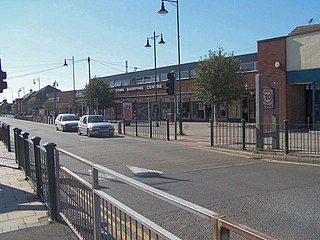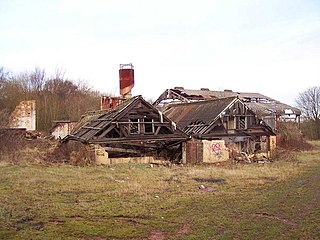
Cannock Chase, often referred to locally as The Chase, is a mixed area of countryside in the county of Staffordshire, England. The area has been designated as the Cannock Chase Area of Outstanding Natural Beauty and is managed by Forestry England. The Chase gives its name to the Cannock Chase local government district. It is a former Royal forest.

Castle Ring is an Iron Age hill fort, situated high up on the southern edge of Cannock Chase, Staffordshire, England.

Cannock is a town in the Cannock Chase district in the county of Staffordshire, England. It had a population of 29,018. Cannock is not far from the nearby towns of Walsall, Burntwood, Stafford and Telford. The cities of Lichfield and Wolverhampton are also nearby.

Rugeley is a market town and civil parish in the Cannock Chase District, in Staffordshire, England. It lies on the north-eastern edge of Cannock Chase next to the River Trent; it is situated 8 miles (13 km) north of Lichfield, 10 miles (16 km) south-east of Stafford, 5 miles (8.0 km) north-east of Hednesford and 11 miles (18 km) south-west of Uttoxeter. At the 2021 Census, the population was 24,386.

Burntwood is a former mining town and civil parish in the Lichfield District in Staffordshire, England, approximately 4 miles (6 km) west of Lichfield and north east of Brownhills. The town had a population of 26,049 and forms part of Lichfield district. The town forms one of the largest urbanised parishes in England. Samuel Johnson opened an academy in nearby Edial in 1736. The town is home to the smallest park in the UK, Prince's Park, which is located next to Christ Church on the junction of Farewell Lane and Church Road. The town expanded in the nineteenth century around the coal mining industry.

Cannock Chase is a local government district in Staffordshire, England. Its council is based in the town of Cannock; other notable towns are Rugeley, Bridgtown and Hednesford. The district covers a large part of the Cannock Chase Area of Outstanding Natural Beauty, from which it takes its name.

The Chasewater Railway is a former colliery railway running round the shores of Chasewater in Staffordshire, England. It is now operated as a heritage railway.

Hednesford ) is a market town and civil parish in the Cannock Chase district of Staffordshire, England. Cannock Chase is to the north, it is 1 mile (1.6 km) to the north of Cannock and 5 miles (8.0 km) to the south of Rugeley. The population at the 2011 census was 17,343.

Cannock Chase is a constituency represented in the House of Commons of the UK Parliament since 2015 by Amanda Milling of the Conservative Party. She served as the Minister for Asia and the Middle East in the Foreign, Commonwealth and Development Office from 16 September 2021 to 7 September 2022.
Brindley Heath is an area of heath land on Cannock Chase situated between Hednesford and Rugeley in the Cannock Chase District of Staffordshire, England. The area also forms a civil parish, which at the 2001 census, had a population of 862, decreasing to 827 at the 2011 Census.

Chasetown is a village in the town of Burntwood in Staffordshire, England. It is split between the civil parishes of Burntwood and Hammerwich.

Cannock railway station serves the town of Cannock in the Cannock Chase, Staffordshire, England. It is situated on the Chase Line. The station and all trains serving it are operated by West Midlands Trains. The station is located over half a mile from the centre of the town, close to the suburbs of Stoney Lea and Hawks Green.

Norton Canes is an industrial village, civil parish and ward of Cannock Chase District, in Staffordshire, England.

The current Cannock Extension Canal is a 1.8-mile (2.9 km) canal in England. It runs from Pelsall Junction on the Wyrley and Essington Canal, north to Norton Canes Docks and forms part of the Birmingham Canal Navigations. Historically, it ran to Hednesford, and served a number of collieries, which provided the main traffic. It opened in 1863, and the northern section closed in 1963, as a result of mining subsidence.
Valley Colliery, commonly known as Valley Pit, was a deep coal mine and training centre located in Hednesford, Staffordshire, UK.

The Cannock Chase Railways were mineral lines which served the collieries and many parts of Staffordshire. The branch lines and sidings branched off the local mainlines including the Grand Junction Railway, Chase Line, South Staffordshire Line and Rugby–Birmingham–Stafford line. The main junction on the railways was Norton Junction. This junction connected the lines from Walsall and Hednesford to Wolverhampton and Rugeley Trent Valley for the local collieries and the mines in the towns of Brownhills, Burntwood, Chasetown, Penkridge and Cannock.
Church Hill is a suburban village in the Cannock Chase district, in the county of Staffordshire, England. The village is located east of Hednesford and south of Rugeley. The village has a church dedicated to St. Peters and is located adjacent to the areas of Rawnsley, Littleworth and Hazelslade. The area is also located near the Hednesford Hills Nature Reserve. The nearest railway station is in Hednesford.

Prospect Village is a small village in the Cannock Chase District of Staffordshire, West Midlands, England. Located between Burntwood and Hednesford. The village is very small with residential houses, a village hall, a pub and service garage. The near churches are in Gentleshaw and Cannock Wood. The village was on a mineral-only line from Hednesford to Burntwood. A former embankment is still visible on Ironstone Road and Cannock Wood Road

Rawnsley is an area of Cannock Chase District, Staffordshire, England. It is located between Hazelslade and Prospect Village. Rawnsley is a former mining hamlet and was served by the mineral line from Hednesford to Burntwood which carried minerals to the mines around the area. There are traces of the former line near modern-day Rawnsley, mostly on Littleworth Road.

Littleworth is an area of Cannock Chase District, Staffordshire, England. The area is mainly residential and industrial. It is located between Wimblebury and Hazelslade. There is a bus service that connects the area with Cannock and Burntwood. The nearest railway station is in Cannock. There is also traces of the former mineral line which ran through the area to Norton Junction from the Chase Line. It is traceable from Nelson Drive and can be seen on Google Maps as a row of trees.

















